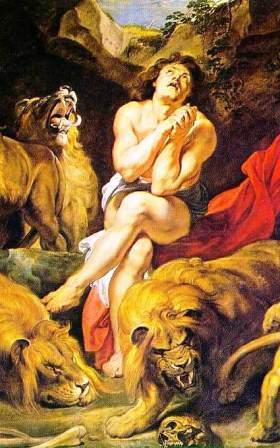
A Beastly King (Daniel 4:19-33)
Daniel was dismayed. Obviously, the Holy Spirit had given him the interpretation of the dream immediately. Although Daniel knew what the dream meant, he did not immediately reveal its meaning to Nebuchadnezzar.
Why would Daniel not want to tell Nebuchadnezzar the meaning of the vision? Nebuchadnezzar had been so good to Daniel. Yet, Daniel is here called upon to pronounce judgment upon him. How easy is it to confront people with the truth? How would you like to pronounce judgment upon your employer? Over one who could easily have you killed?
Daniel also seems to be honoring the king by withholding its interpretation at first. Notice what Daniel says as he begins to interpret the dream: “My lord, may the dream be for those who hate you and its interpretation for your enemies!” Why would Daniel want to honor a king who was a pagan, built a pagan idol, and attempted to have his three companions burned alive?
Nebuchadnezzar wants to know what the dream means; therefore, he urges Daniel to relate the dream’s meaning without fear.
Daniel relates the dream back to Nebuchadnezzar almost verbatim as to what the king has said. This seems to be for emphasis/dramatic effect. After relating the dream and heightening the suspense, Daniel says, “It is you.”
It was a decree of the Most High that Nebuchadnezzar become insane. This was something far more than simply a case of mental illness. This is a case of divine punishment/instruction.
The purpose of Nebuchadnezzar’s illness was so that the king would understand that God is the One who is sovereign in the kingdoms of men. Nebuchadnezzar’s illness would serve as a serious reminder to the Israelites of the sovereignty of God. They might be tempted to doubt if God were really sovereign if he were allowing all these terrible events to befall them. Yet, Nebuchadnezzar’s illness would demonstrate conclusively that God is in ultimate control.
The stump was left in the ground to demonstrate to Nebuchadnezzar that his kingdom could be restored to him if he acknowledged the rule of God. If Nebuchadnezzar would break off his sins by practicing righteousness, God would establish him in the kingdom. Does this indicate that all the leaders of government are subject to God? Might the leaders of government need to answer to God for how they have governed?
A year after the dream, Nebuchadnezzar was walking on his roof, boasted in the great Babylon he himself had built, and he became insane.
Why would God wait a year to fulfill this prophecy against Nebuchadnezzar? The fulfillment of the prophecy demonstrates just how accurate Daniel has been. After this, there can be no doubt in Nebuchadnezzar’s mind. There should also be no further doubt in the minds of the Jewish nation.
Nebuchadnezzar had done remarkable work in Babylon. He rebuilt more than twenty temples. Most of the bricks uncovered in archeological excavations bear the name “Nebuchadnezzar.” One of the records of Nebuchadnezzar that archeologists have found reads: “The fortifications of Esagila and Babylon I strengthened and established the name of my reign forever.”
As said before, many liberal “scholars” claim that the Book of Daniel was written 400 years after the Babylonian Captivity. How would a person writing 400 years later know that the magnificence of Babylon was due to Nebuchadnezzar’s building projects? We know this because of archeological excavation, but how could someone without that advantage know?
The judgment came from heaven while the word was still in Nebuchadnezzar’s mouth. The king had not even finished all his boasting when the voice came from heaven and announced judgment.
The king’s hair became like eagle’s feathers-it was left untrimmed. His nails were also uncared for and became quite long-like a bird’s claws.
There is no historical record of Nebuchadnezzar’s insanity. This is likely for two reasons:
- Kings did not commonly record their failures.
- Nebuchadnezzar was certainly kept from the public eye during this time.
This Bible class lesson was originally taught by Dr. Justin Imel, Sr., at the Alum Creek church of Christ in Alum Creek, West Virginia.





